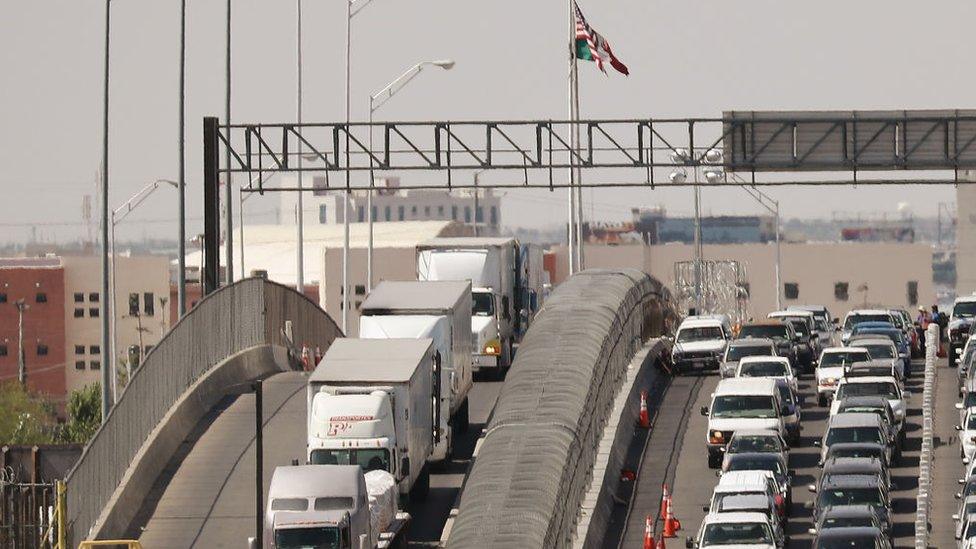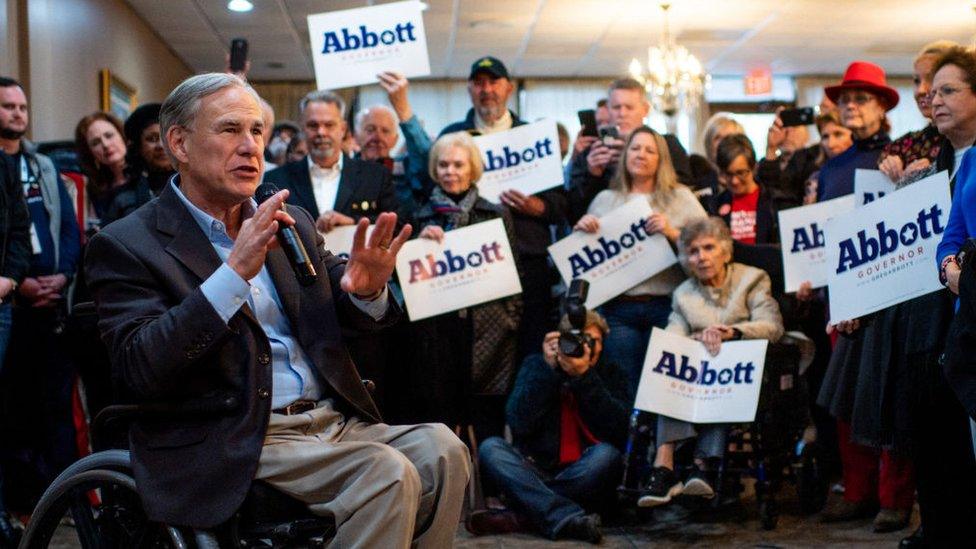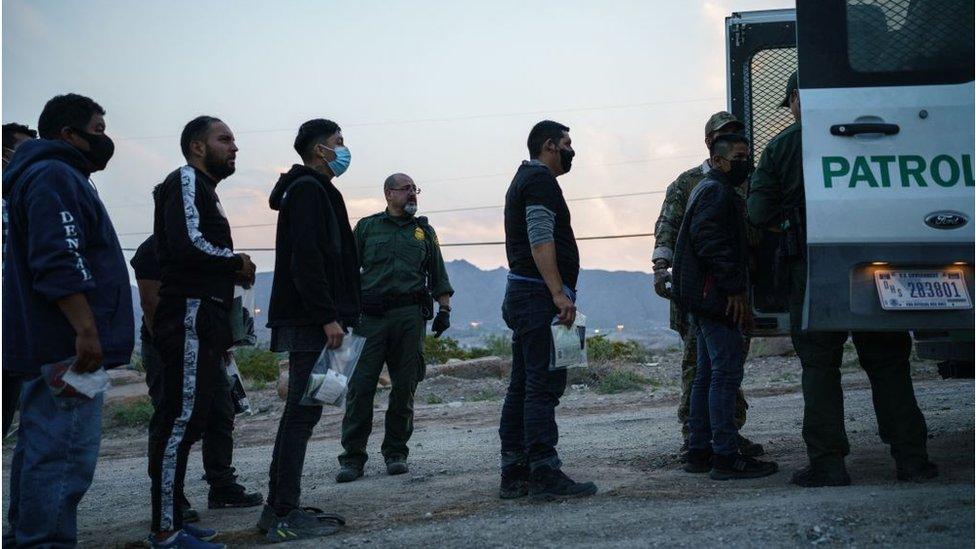Why are Texas truckers in five-hour traffic jams?
- Published

Wait times to cross the border have stretched to as long as five hours
Traffic has ground to a near standstill at several key US-Mexico border crossings in Texas, the result of new inspection requirements imposed by the state's governor - and subsequent protests by Mexican truckers angry about the policy.
Lines of trucks carrying refrigerated agricultural goods, automobiles and industrial parts awaiting entry into the US have stretched for more than five miles at key border checkpoints near the US cities of El Paso, McAllen and Laredo this week.
According to the US Customs and Border Protection agency, wait times at some border crossings are exceeding five hours, in spite of a 60% reduction in typical commercial traffic.
The delays began after Texas Governor Greg Abbott announced last week his state would conduct supplementary inspections of all commercial vehicles entering the US from Mexico even after they cleared US government customs.
In ordering what he called "enhanced safety inspections", Mr Abbott said the move was a response to US President Joe Biden's recent decision to rescind a pandemic-related Trump administration policy that allowed the immediate expulsion of all undocumented migrants detained at the border, regardless of asylum claims, rather than processing them on US territory.
The change to the policy - known as Title 42 - is scheduled to go into effect on 23 May. US authorities predict it will lead to a new surge in undocumented migrants attempting to enter the US from Mexico.
"We will use any, and all, lawful powers to curtail the flow of drugs, human traffickers, illegal immigrants, weapons and other contraband into Texas," Mr Abbott said when announcing the new inspections.
The delays caused by the policy have infuriated Mexican truckers who, taking a page from the Canadian drivers who closed down a key US-Canadian entry point near Detroit in protest against Covid rules in February, blocked all traffic at several US border crossings.
On Wednesday, Mr Abbott rolled back his supplemental inspections at one border checkpoint, citing an agreement with the governor of the Mexican state of Nuevo Leon to increase inspections on its side of the seven-mile border it shares with Texas.
"Clogged bridges can end only through the type of collaboration that we are demonstrating today between Texas and Nuevo Leon," Mr Abbott said.

Greg Abbott is running for a third term as Texas governor - and is thought to have presidential ambitions
Given the Texas-Mexico border runs for more than 1,200 miles along the Rio Grande river and has 13 commercial ports of entry, this one reopening is not expected to have a substantive effect on the ongoing delays.
Mr Abbott's order, and its potential economic effects, have made national headlines, given that Mexico supplies agricultural goods to much of the United States. White House press secretary Jen Psaki on Wednesday condemned Mr Abbott's inspections as "unnecessary and redundant".
US Customs and Border Protection also issued a statement defending its current screening of the millions of commercial trucks and hundreds of billions of dollars of goods that cross the US border each year, which it says relies on "non-intrusive" inspection, risk-based assessments and closer scrutiny when necessary.
"Our efforts ensure shipments of perishable goods, like fruits, vegetables and meat products destined to grocery stores, medical supplies and medicines reach doctor's offices and hospitals and manufacturing supplies reach plants to keep them open," the agency said.
"The movement of these goods are vital not only to communities along the border but across the United States as these goods are used across every business sector and industry in the US."
Mr Abbott, who is running for a third term as governor in November and is believed to harbour presidential ambitions in 2024, may welcome a fight with the federal government and a Democratic Biden administration that is unpopular in his home state.
When he announced the new inspection policy last week, he also unveiled a programme to offer free transportation for undocumented migrants from Texas border towns to Washington, DC - a move seen as more symbolic than substantive.
Mr Abbott's border-inspection move could have some unpleasant political blowback, however, if Texas businesses and consumers blame him for the economic impacts of the delays. Already there are signs of dissent within the ranks of Texas Republicans.
"The policy will hurt Texas and American consumers by driving up already skyrocketing food prices, worsening ongoing supply chain disruptions, causing massive produce shortages, and saddling Texas and American companies with untold losses," writes Texas Agriculture Commissioner Sid Miller in an open letter to the governor. "You can't solve a border crisis by creating another crisis!"
In the letter, Mr Miller touts his grass-roots conservative bona fides, noting he was the first Texas Republican to endorse Donald Trump for president and "fully embraces" a US-Mexico border wall.
"There has been no stronger advocate for securing our border with Mexico and stopping illegal immigration," he says. "This policy does neither."
Mr Abbott's opponent in November's election is Beto O'Rourke, the one-time rising star in the Democratic party who nearly unseated Senator Ted Cruz in the 2018 congressional mid-term elections.
Mr O'Rourke's star has dimmed somewhat since a lacklustre campaign for the 2020 Democratic presidential nomination, but he still maintains high name recognition in the state and an established network of grassroots support.
On Monday, the Democrat travelled to the border in Laredo, where he stood in front of a line of trucks and called Mr Abbott's policy a "political stunt", as Texas inspection officials can only perform safety inspections of the vehicles and have no authority to search incoming cargo.
According to recent polling, Mr Abbott has maintained a comfortable but not insurmountable lead over his opponent in recent months. The governor has a significant financial advantage over Mr O'Rourke as well, with more than $60m on hand as of February, compared to the Democrat's $6m.
While Mr Abbott continues to be the odds-on favourite for re-election - particularly given what should be a national political environment friendly to Republicans - border delays that blossom into a full-blown crisis could shake up a race that has largely been stable so far.
It would be a crisis fully within Mr Abbott's ability to end, however, which suggests it's unlikely the governor would allow it to reach that point.
Related topics
- Published13 August 2021

- Published18 September 2021

